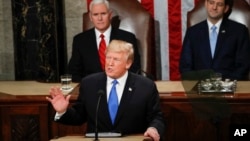In his first State of the Union address, U.S. President Donald Trump referred to China as a rival and declared an end to what he called an era of economic surrender.
The Trump administration has repeatedly accused China of trade abuses and more trade actions against Beijing are expected soon, but the president did not mention the world’s second largest economy directly when he pledged to protect intellectual property and fight for fair and reciprocal trade.
Some analysts said that could be for a number reasons that include expectations his administration may soon announce even more trade measures. The other possibility is that there are different views on China within the U.S. government and there is no clear path forward.
Julian Evans-Pritchard, an economist at Capital Economics in Singapore said the Trump administration appears to be taking a more cautious approach.
“The risk, I guess, is that if you push too hard against China then they might retaliate in a manner that it causes more damage to the U.S. than the damage that China gets,” he said, adding, “It is clear that there are different views on China within the government."
Trump recently announced stiff tariffs on solar panels and washing machines and has said his administration is considering a big fine as part of a probe into China’s alleged intellectual property theft.
Evans-Pritchard said there will probably be decisions soon on whether to impose a tax on steel and aluminum, as well as action on intellectual property rights infringements in China, but the administration does not appear to be pushing back as much as it can.
Will China change?
“China is an exporting country, which may have more to lose in a trade war, but the difference in China’s case is that the Chinese government has a lot more power to make life difficult for foreign firms, and in the U.S. the power to do so is much more limited by the restrictions on the powers of the government in the U.S.,” he said.
Christopher Balding, an associate professor of finance and economics at Peking University HSBC Business School said one reason China received less attention in the speech is perhaps a sign that President Trump is starting to learn how to be a little more self-disciplined and not always, in Balding's words, “shoot off at the mouth.”
"That could change tomorrow," but the president has already criticized China frequently “and it doesn’t need to be pounded into the ground,” Balding said.
Analysts say it may also be due to a growing consensus that China does not care.
For years, many have hoped that China would integrate into the global world order and become a more market-based, liberal economy. But now the broader consensus among foreign policy experts and others is that such progress will not happen.
“China has made it very clear that they are going to be an authoritarian projecting state and anyone who disagrees with them will be blocked to task,” Balding said.
Paths ahead
China’s Foreign Ministry flatly rejected Trump’s assessment of Beijing as a rival, and urged Washington to put aside what it called a “Cold War mentality” and “zero-sum game” approach to relations.
“Cooperation is the only correct choice for China and the United States, and a win-win approach is the only way to build a better future,” Foreign Ministry spokeswoman Hua Chunying told reporters at a briefing shortly after the speech.
Trump’s speech was softer on Beijing than a recent strategy report from the U.S. Department of Defense, which said Russia and China are bigger threats to the United States than terrorism.
“Around the world, we face rogue regimes, terrorist groups, and rivals like China and Russia that challenge our interests, our economy and our values,” the U.S. president said his Tuesday night address.
“In confronting these dangers we know that weakness is the surest path to conflict, and unmatched power is the surest means of defense,” Trump said.




